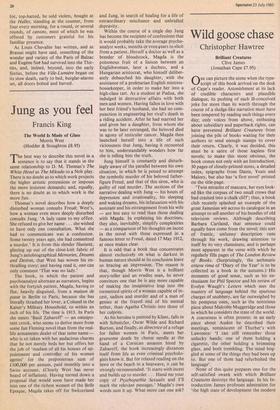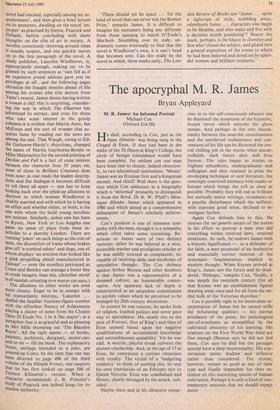Wild goose chase
Christopher Hawtree
Brilliant Creatures Clive James (Jonathan Cape £7.95)
One can picture the scene when the type- script of this book arrived on the desk of Cape's reader. Astonishment at its lack of credible characters and plausible dialogue, its pushing of each ill-conceived joke for more than its worth through the course of a sludge-like narrative must have been tempered by reading such things every day; only voices from above, enthusing about subsidiary and paperback rights, can have prevented Brilliant Creatures from joining the pile of books waiting for their authors to send enough stamps to cover their return. Clearly, it was decided, this must be a satire of those hapless first novels; to make this more obvious, the book comes not only with an Introduction, 30 pages of closely-printed notes, a detailed index, epigraphs from Dante, Yeats and Malory, but also has 'a first novel' printed on the title-page.
'Twin miracles of mascara, her eyes look- ed like the corpses of two small crows that had crashed into a chalk cliff'; thus, a book club recently splashed an example of the great Jamesian wit across its catalogue in an attempt to sell another of his bundles of old television reviews. Although describing Barbara Cartland, that sentence could equally have come from the novel; this sort of frantic, unfunny description runs through his work, drawing attention to itself by its very clumsiness, and is perhaps most apparent in the verse with which he regularly fills pages of The London Review of Books. (Surprisingly, the asthmatic ottava rima of 'Diary of the Year' is to be collected as a book in the autumn.) His moments of good sense, such as his en- thusiasm for Phil Spector and his review of Evelyn Waugh's Letters which sees the mastery of language behind the spurious charges of snobbery, are far outweighed by his pompous ones, such as the notorious piece about Malcolm Muggeridge and those in which he considers the state of the world. A coarseness is often present: in an early piece about Auden he described their meetings, reminiscent of Thurber's with Lawrence: 'I can still remember those unlucky hands; one of them holding a cigarette, the other holding a brimming glass, and both trembling. The mind bog- gled at some of the things they had been up to. But one of them had refurbished the language'.
None of this quite prepares one for the self-satisfied swank with which Brilliant Creatures destroys the language. In his In- troduction James professes admiration for 'the high state of development the modern novel had reached, especially among my ac- quaintances', and then gives a brief lecture on its ancestors, dwelling on the novel 'im- proper' as practised by Sterne, Peacock and Firbank, before concluding with more thoughts on the role of art in society. A novelist consciously throwing around ideas is usually suspect, and one quickly moves on to the first paragraph of the novel. A shady publisher, Lancelot Windhover, is, appropriately enough, waking up, to be greeted by such sentences as 'rain fell as if an expensive postal address gave you no privileges at all', and the following pages chronicle the fraught months ahead of life among his cronies (the title derives from Yeats's swans). James denies having written a roman a clef; this is surprising, consider- ing the way in which The Observer has advertised its extract, and even for those who take scant interest in the gossip columns it is evident that Martin Amis, Ian McEwan and the sort of woman that ac- quires fame by reading out the news are among the cast. That Waugh, owing to Ed- die Gathorne-Hardy's objections, changed the name of Martin Gaythorne-Brodie to Miles Malpractice for the second printing of Decline and Fall is a fact of some interest because the character lives 55 years on; none of those in Brilliant Creatures does even now: as one reads the leaden descrip- tions and flat dialogue it becomes difficult to tell them all apart — one has to keep looking back over the piled-up allusions to discover to which woman Windhover is shakily married and with which he is having an affair and whether either, or both, is the one with whom the lurid young novelists are smitten. Similarly, unless one has been to Kyoto, New York or Los Angeles one gains no sense of place from these in- terludes to a sketchy London. There are running 'jokes' on such things as the cost of taxis, the discomfort of trains whose brakes give off 'a urethral odour' and dogs, one of whom displays 'an erection that looked like a pink propelling pencil manufactured in Taiwan' — even the novelists portrayed as Crane and Bentley can manage a better line M crude imagery than this. (Another motif Is of vandals urinating over motor-car seats.) The allulions to other works are even more clumsy. Eager to be in contact with his transatlantic mistress, 'Lancelot ... dialled the familiar fourteen-figure number with the effortless fluency of Ashkenazey Playing a cluster of notes from the Chopin Opus 25 Etude No. 1 in A flat major'; as a metaphor that is as graceful and as pleasing as Mrs Mills thumping out 'The Blaydon. Races'. All the right names — of books, Painters, architects, designers, motor-cars and so on — fill the book. The explanatory Notes, perhaps intended as a joke, are souped-up Coles; by the time that one has been directed to page 496 of the third volume of the Pleiade Proust, one suspects that he has first looked up page 506 of Terence Kilmartin's version. When a character recommends J. B. Priestley's Study of Peacock one indeed longs for its modest authority. 'There should yet be space ... for the kind of novel that can never win the Booker Prize,' remarks James. It is difficult to imagine his customers being any different from those queuing to watch O'Toole's Macbeth. Stumbling over its stale, un- dramatic scenes eventually to find that the novel is Windhover's own, it is one's head that becomes sore. Can this really be the novel in which, three weeks early, The Lon- don Review of Books saw 'James upon a tightrope of style, wobbling away, relentlessly funny ... characters who begin to be likeable, and who make and live with a decision worth pondering'? Nearer the mark, perhaps, is the Major in Dombey and Son who 'closed the subject, and glided into a general exposition of the extent to which he had been beloved and doted on by splen- did women and brilliant creatures.'







































 Previous page
Previous page